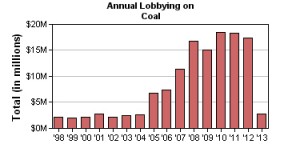Since the financial crisis in 2008 a desperate cry has been
made by many economic and public policy experts: Bring back the Glass-Steagall
Act! The demand has graced the pages of hallowed financial publications like
the Wall
Street Journal and Forbes. Groups of average Americans have formed Facebook
groups to push the Act’s revival. It was name checked in the arguably
amorphous list of demands by Occupy Wall Street movement of two years ago. Multiple
Nobel Prize Winning Economists have lamented its repeal.

So, a lot of people were likely delighted by the recent news
that two unlikely allies, Senator John McCain (R-AZ) and Senator Elizabeth
Warren (D-MA) have mounted an attempt to
bring back many of the features of Glass-Steagall. These same people will also be equally disappointed
when the bill is slaughtered before it even gets a vote.
Why am I so confident (or cynical might be the right word)
that the bill won’t see the light of day? For a couple of reasons really, but let’s
first back up and look at what Glass-Steagall was.

Following the Stock Market Crash of 1929 and the ensuing
economic devastation, Congress pulled together and passed the Banking Act of 1933.
This bill established the Federal Deposit Insurance Corporation (FDIC) and set
new regulations on speculation and banking. Included in the bill were
provisions set forth by Senator Carter Glass (D-VA) and Henry Steagall (D-AL)
that created a hard wall between depository and investment banks—that is, under
this provision a low-risk commercial bank that took customer deposits, issued
receipts and lent money would not be able to make the high risk financial
maneuvers that banks specializing in securities and investments could. This was
to avoid the potential loss of said deposits in failed investment strategies
since those deposits were never explicitly made by customers for the purpose of
speculation.
Blocking the unnecessary exposure of commercial deposits to
the wild valuation swings of speculative investment activities should be common
sense considering the aforementioned FDIC program and its responsibility to
insure commercial bank deposits. As Nobel Prize Winner in Economic Sciences
Joseph Stiglitz pointed
out in 2009:
“Commercial banks
are not supposed to be high-risk ventures; they are supposed to manage other
people’s money very conservatively. It is with this understanding that the
government agrees to pick up the tab should they fail. Investment banks, on the
other hand, have traditionally managed rich people’s money—people who can take
bigger risks in order to get bigger returns.”
But common sense and profitability don’t always overlap and
the financial industry tends to be more interested in the latter. They weren’t
concerned about the FDIC being on the hook if things went sour. They simply wanted
the ability to merge investment and depository banks to tap into those
commercial balance sheets for further investment leverage.
And more often than not, it seems, what the financial
industry wants the financial industry gets. So, in late 1999 lobbying
expenditures of roughly $300 million and years of working the back channels of
Washington culminated in the financial industry getting what it wanted: a silver
bullet bill—the Gramm Leach Bliley Act— that definitively erased Glass Steagall
from the regulatory tool kit. Immediately, mergers between commercial and
investment banks began en masse.
So, the first reason that the McCain-Warren effort to bring
about a return of Glass-Steagall-styled banking regulation is largely an
exercise in futility is that the financial industry simply doesn’t want it to
happen. And they spread enough money around Capitol Hill and K-Street to be
heard loud and clear. Just last year’s combined Commercial and Financial
Banking lobbying expenditures totaled over $159 million which put it third
highest on the list of total industry lobbying expenditures. That’s an
undoubtedly hefty investment, but it has paid off time and time again. It
worked to repeal numerous banking regulations throughout the 80’s and 90’s, it worked
to finally kill Glass-Steagall in ’99 and it’s working again as the industry
has largely been successful in emasculating the Dodd-Frank Act; the first
attempt at wrangling in the excesses of Wall Street following the 2008
financial implosion. Let’s take a closer look at how the financial industry
reacts to legislation that it doesn’t care for:
Following passage of Dodd Frank in 2010—no small miracle in
itself, even with the American people considerably outraged at that point—the
financial industry went into overdrive on the Hill. Their strategy was a
multi-pronged approach. First, they sent in a veritable army of lobbyist to
persuade Congress members to defund the regulatory agencies necessary for
enforcement of the bill. In a long, fairly underreported fight, bank lobbyists outnumbered
the bill’s advocates 20
to 1. They outspent the bill’s advocates by an even larger margin. They
also got more face time with representatives by a margin of nearly 9 to 1. This
fire-hose approach proved rather effective. In addition to cutting off
significant funding, they also successfully pushed to have all of the rules and
legal language of the bill written by the individual regulatory agencies
themselves.
The second part of the assault was a wave of regulatory
attorneys. If a regulator were to somehow successfully publish a rule, the
banks would immediately take that regulator to court and, at the very least,
effectively gum up the rule’s implementation for years; sometimes only over
minor technicalities. One such litigator, Supreme Court Justice Antonin Scalia’s
son Eugene has already filed seven of these types of suits. Long story short:
Less than half of the rules that had been outlined in Dodd-Frank have been
finalized. It’s basically a zombie bill; there in appearance and name but
effectively dead. And the American people still have no real protections
against the same economic dangers they faced from the financial industry in the
fall of 2008, even as many Americans seem to be unaware or, in some cases,
willfully ignorant of them.
This brings me to the next inevitable roadblock to any
attempt to bring back the most important elements of Glass-Steagall. There is,
in today’s Congress, an active ideological barrier to necessary and responsible
financial regulation. There is a school of thought among many of the
conservative members of Congress—particularly those swept in by the Tea Party
Movement of the 2010 elections—that government regulation of any kind is an
inherently bad thing. Regulation, they have stated time and again, places an
impediment on free market capitalism which, they posit, is entirely unnecessary
due to the self-correcting nature of the economic system. Of course, this
assertion is absurd. After all, many of the most fervent of free market
advocates were forced to recalibrate their ideology in the face of the economic
destruction of ‘08, including former Federal Reserve Chairman Alan Greenspan
who conceded
in a House Committee hearing that there was a “…flaw in the model that I
perceived is a critical functioning structure that defines how the world works,
so to speak”. But those
that still buy into the myth of the innate perfection of absolute free market
economics will not be dissuaded regardless of these documented concessions or
ample evidence to the contrary of their position.
One of the most important things that Dodd-Frank attempted
to do was to impose some regulation on the real monster of the financial
meltdown: financial derivatives like credit default swaps. While the housing
bubble bust was the catalyst for the crisis, it was the near implosion of nearly
$700 Trillion in outstanding, unregulated derivatives—ten
times the GDP of all the world’s countries combined—that very nearly killed
the global economy. Basically, financial institutions had made massive unofficial
side bets that they simply didn’t have the capital to cover. When the bets went
bad they set off a chain reaction of more bets going bad and as the reality of
the situation became apparent the trust so necessary to have a functioning
economy nearly disappeared overnight. Credit markets froze. People panicked.
Stock Markets tumbled. Ultimately, the government had to “inject liquidity” on
a never-before-seen scale to restore confidence. Considering this, some
oversight of the derivatives market and the amounts of capital that financial
institutions would be allowed to place in it would seem to be, once again, common
sense. Think again.
A number of bills that push for the return of deregulation of derivatives
have now made their way out onto the floor of the House of Representatives. A
co-sponsor of one of these bills, Rep. Scott Garrett, explained his support of
the bill, "Our job creators -- millions being crushed
by overly burdensome Washington
Not even five years after the world teetered on financial
ruin and potential civil unrest and many members of Congress are once again
ideologically and financially motivated to load another bullet in the chamber
for round two of Global Economic Russian Roulette. Very few stand in the way
and those that do are undeniably outgunned and outspent. It won’t be any
different for this attempt to reinstate Glass-Steagall. What McCain and Warren
(as well as Senators Angus King and Maria Cantwell) are attempting to do is
undoubtedly noble but equally impossible.




